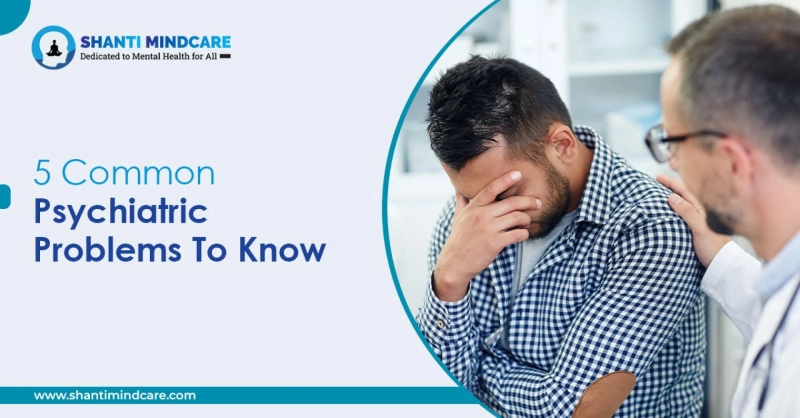Common doesn’t mean not concerning. A psychiatric condition is a mental illness that affects how a person thinks, behaves, and acts. Untreated psychiatric problems lead to numerous health risks. Medical attention and care are required. With medical guidance and lifestyle improvements, you can heal mental illnesses.
Visit your doctor if you undergo signs of depression, uncontrolled anxiety, sleep issues, exaggerated anger, inability to control negative thoughts, etc. You might visit the best psychiatric hospital in Siliguri and get optimum mental health care. This reading talks about five common psychiatric conditions; let’s explore them.
Anxiety Disorder
Anxiety disorder requires medical attention for promising anxiety management. When nervousness or being anxious occasionally happens to almost all, anxiety disorder is never to overlook. Agoraphobia, generalized anxiety disorder, specific phobias, separation anxiety disorder, panic disorder, and social phobia are some of the types of anxiety disorders.
Extreme nervousness, sweaty hands, rapid heartbeat, loss of consciousness, trembling, breathing issues, trouble sleeping, trouble concentrating, and gastrointestinal problems are some symptoms of anxiety disorder.
Bipolar Disorder
However, the root cause of bipolar disorder is still unknown. Genetics, brain chemistry, or biological differences may have a role here. Exposure to high stress, having a first-degree relative with bipolar disorder, or substance use (drug/alcohol) may contribute to bipolar disorder.
Manic depression or bipolar disorder leads to extreme mood swings marked by emotional highs and depression/lows. In mania and hypomania, people have signs like euphoria, less requirement for sleep, being talkative, exaggerated energy, too much activity. Talk to the best psychiatric doctor in Siliguri for bipolar disorder.
In major depressive episodes, people feel hopelessness, emptiness, tearfulness, loss of pleasure, loss of interest in activities, insomnia or hypersomnia, loss of energy, suicidal thoughts, fatigue, worthlessness, restlessness, etc.
Depression
Major depressive disorder results in a loss of interest in activities, a sense of worthlessness, emptiness or loneliness, and hopelessness. It also causes anxiety outbursts, fatigue, sleeplessness or hypersomnia, changes in appetite, agitation, anxiety, restlessness, suicidal thoughts, and attempts. Physical problems like aches or pain, weight gain, or weight loss.
Personality traits like dependent personality, self-critical personality, or low self-esteem may increase the likelihood of depression. Other contributing factors include exposure to stressful events, a family history of depression, recreational drug abuse, substance use disorder, and chronic illnesses like heart disease, stroke, cancer.
Schizophrenia
Schizophrenia causes people to interpret reality in an unusual way. This serious mental condition impairs thinking, emotions, and behaviors. The individual with schizophrenia may experience disorganized speech, delusions, hallucinations, etc.
The distinctive cause of schizophrenia is still unknown. Genetics, brain chemistry, or environmental stress or situations may lead to schizophrenia. Schizophrenia in blood relatives, birth complications, and mind-altering meds at an early age may put one at risk of schizophrenia. Consult a specialist at the best psychiatric hospital in Siliguri.
Post-Traumatic Stress Disorder
PTSD is a mental condition triggered by undergoing or witnessing a stressful life event. The person with post-traumatic stress disorder gets flashbacks, excessive anxiety, uncontrollable thoughts, and nightmares concerning that terrifying event.
Post-traumatic stress disorder may begin within one month of that exposure to the stressful event. Negative changes in mood, and thinking patterns, avoiding situations or activities, recurrent memories of that traumatic event, extreme emotional distress, self-destructive actions, depression, anxiety, eating disorders, and drug abuse are the complications of PTSD.


